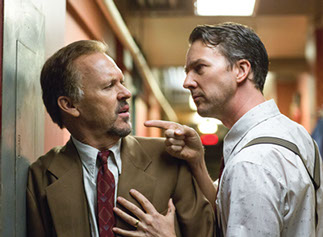

Riggan Thomson (Michael Keaton) in his underwear, levitating in a yoga pose, his back to us, wondering, “How did we end up here? This place is horrible. Smells like balls...” Undoubtedly we are in for a comedy...a dark one. But it is not he who is talking but Birdman---present throughout the movie either physically or audibly as Riggan’s alter ego, the character that catapulted him to celebrity status in the Hollywood he is now trying to escape from by attempting to be a respected Broadway director and actor. Few will fail to find some parallel in Michael Keaton himself stepping away from doing another Batman movie.
 Riggan is adapting a Raymond Carver short story, What We Talk About When We Talk About Love. This is theater and with so much riding on opening night, everything that can go wrong does. Beginning with one of his leading actors being knocked out of commission by a stage light and having to replace him merely days before the opening. Lesley (Naomi Watts), one of his leading ladies, on the verge of her big break and desperate to have her Broadway debut, brings in her boyfriend, Mike Shiner (Edward Norton) who manages to be endearing even when there isn’t much to like in his character. He increases the ticket sales but can derail it all with his own insecurities, instability and volatility. That, of course, if the New York Times theater critic (Lindsay Duncan) doesn’t beat him to it by wielding her power to break the show with her review on opening night.
Riggan is adapting a Raymond Carver short story, What We Talk About When We Talk About Love. This is theater and with so much riding on opening night, everything that can go wrong does. Beginning with one of his leading actors being knocked out of commission by a stage light and having to replace him merely days before the opening. Lesley (Naomi Watts), one of his leading ladies, on the verge of her big break and desperate to have her Broadway debut, brings in her boyfriend, Mike Shiner (Edward Norton) who manages to be endearing even when there isn’t much to like in his character. He increases the ticket sales but can derail it all with his own insecurities, instability and volatility. That, of course, if the New York Times theater critic (Lindsay Duncan) doesn’t beat him to it by wielding her power to break the show with her review on opening night.
We see Riggan grappling with his insecurities, his aging, and his relevance. At one point, his just out-of-rehab daughter Sam (Emma Stone, who blends sexiness, vulnerability and innocence wonderfully) reinforces how irrelevant Riggan really is. “You are scared to death, like the rest of us, that you don’t matter. And you know what? You’re right. You don’t!” Interacting with an ex-wife (Amy Ryan) and the guilt inherent when accepting his responsibility of divorce. Dealing with his young lover and other leading lady Laura (Andrea Riseborough). Throughout he is accompanied, encouraged, babied by his producer and friend Jake (brilliantly played by Zach Galifianakis) which has almost as much as Riggan riding on the show. Keaton’s performance is subtle, funny and moving. Credible even when he is exercising what seems to be his telekinetic powers. Whether he has them or not (we are offered conflicting clues) is unimportant. It’s a way for us to take part in his anger and release.
Yet there are two stars that stand out even more, and they are behind the camera. Emmanuel Lubezki’s cinematography is perfect in showing imperfection, both literally and figuratively. In its extreme close ups we see every speck of dust every bead of sweat, and spit coming out the actor’s mouth, so much so that you may feel the need to duck to avoid getting hit. The camera shots are long and seamless as he maneuvers through claustrophobic hallways of the theater backstage and move so fast in a pas de deux that soon mulitiplies It traverses the film as Birdman himself would, like a bull in a china shop at times, smoothly at others, and captivating every single time. Lubezki, who won an Oscar for Best Achievement in Cinematography in Gravity, has outdone himself.
And then there is Alejandro González Iñárritu. His directing and storytelling are quite compelling. He sucks us into a whirlwind you fight hard to retain your footing in, and captures Broadway’s essence beautifully and faithfully. And the battle of Hollywood celebrity vs. Broadway and “serious acting” is true to life.
Iñárritu’s film is strange in many ways, quirky and odd but a unique gem shining brightly due to all the facets he cuts into it. Its ultimate shine is blinding. The full movie title is long: Birdman, or the Unexpected Virtue of Ignorance, but like the movie itself, don’t try to take it in all at once. Birdman will do. It’s a movie you will want to see again, either because you have missed nuances, or simply because you didn’t quite get it the first time.
Lidia Pires